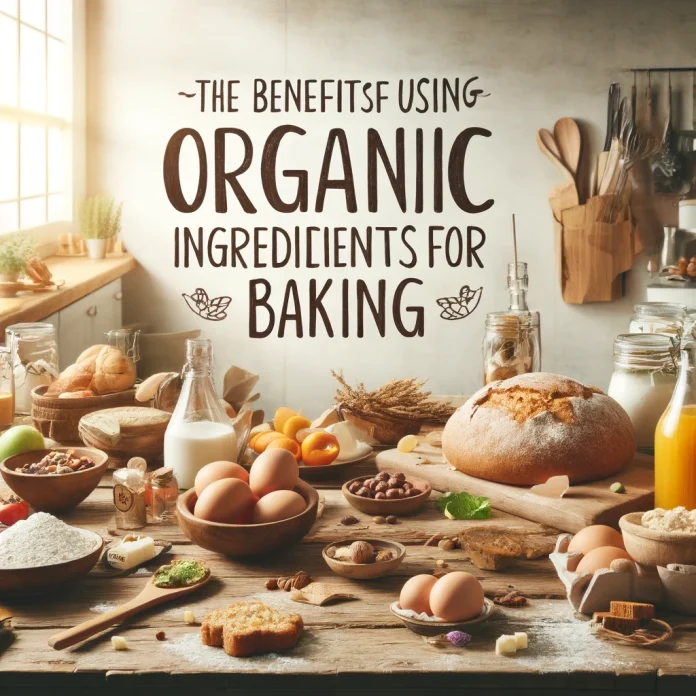Baking is both an art and a science, where every ingredient plays a crucial role in the final product. As health and wellness trends gain momentum, more bakers are turning to organic ingredients to enhance their creations. This article explores the myriad benefits of using organic ingredients in baking, shedding light on how they can elevate the taste, texture, and nutritional value of your baked goods.
What Are Organic Ingredients?
Organic ingredients are produced without the use of synthetic pesticides, fertilizers, genetically modified organisms (GMOs), antibiotics, or growth hormones. They adhere to specific agricultural standards, which emphasize the use of natural substances and processes. This commitment to natural production methods translates into several benefits for both consumers and the environment.
Table of Contents
Health Benefits of Organic Ingredients
1. Higher Nutritional Value
Organic ingredients often boast higher nutritional content compared to their conventionally grown counterparts. For instance, organic whole grains, nuts, and seeds used in baking are richer in vitamins, minerals, and antioxidants. These nutrients contribute to overall health and wellness, providing essential compounds that support various bodily functions.
2. Free from Harmful Chemicals
Using organic ingredients in baking means you are avoiding harmful chemicals that are commonly found in conventional farming. Pesticide residues and synthetic additives can pose health risks over time. By choosing organic, you ensure that your baked goods are free from these unwanted substances, making them safer for consumption, especially for children and those with sensitive health conditions.
Environmental Benefits of Organic Baking
3. Sustainable Farming Practices
Organic farming practices are designed to be sustainable and environmentally friendly. They focus on maintaining soil health, conserving water, and reducing pollution. By using organic ingredients, bakers support farming methods that protect and nurture the ecosystem, promoting biodiversity and reducing the carbon footprint.
4. Reduction in Soil and Water Contamination
Conventional farming often leads to soil and water contamination due to the heavy use of synthetic chemicals. Organic farming, on the other hand, utilizes natural compost and biological pest control, significantly reducing the risk of contamination. This ensures that the soil remains fertile and water sources remain clean, benefiting both the environment and human health.
Culinary Advantages of Organic Ingredients
5. Superior Flavor and Quality
One of the most compelling reasons to use organic ingredients in baking is the superior flavor and quality they bring to your creations. Organic fruits, vegetables, and grains are grown in nutrient-rich soil, which enhances their natural taste and aroma. This translates into baked goods that are not only healthier but also more delicious and aromatic.
6. Better Texture and Consistency
Organic baking ingredients, such as organic flour and sugar, often yield better texture and consistency in baked goods. The natural growth processes ensure that these ingredients retain their structural integrity, leading to fluffier cakes, crispier cookies, and more tender pastries. Organic eggs and dairy products also contribute to richer and more cohesive doughs and batters.
Economic and Ethical Considerations
7. Supporting Local Farmers
Purchasing organic ingredients often means supporting local farmers who adhere to sustainable farming practices. This not only boosts the local economy but also ensures that you are consuming fresher and more ethically produced food. Many local farmers markets and co-ops offer a variety of organic baking ingredients, making it easier to source high-quality products.
8. Ethical Consumption
Choosing organic is also an ethical decision. Organic farming practices are generally more humane and consider the welfare of farm workers and animals. By opting for organic ingredients, bakers align themselves with ethical consumption patterns, promoting fair trade and humane treatment within the agricultural sector.
Practical Tips for Baking with Organic Ingredients
9. Start with Basic Swaps
Begin your journey into organic baking by making simple swaps. Replace conventional flour, sugar, and eggs with their organic counterparts. Gradually, you can expand to organic fruits, nuts, and dairy products. These small changes can significantly impact the quality and health benefits of your baked goods.
10. Read Labels Carefully
Not all products labeled “organic” are created equal. Look for certifications from reputable organizations such as USDA Organic, which ensure that the products meet stringent organic standards. Reading labels carefully will help you make informed choices and avoid misleading claims.
11. Experiment with Recipes
Organic ingredients can sometimes behave differently than conventional ones. Be prepared to experiment with your recipes to find the perfect balance. For instance, organic flour may absorb more liquid, requiring slight adjustments in your dough or batter consistency.
Conclusion
Incorporating organic ingredients into your baking repertoire offers a wealth of benefits, from improved health and superior flavor to environmental sustainability and ethical consumption. By making the switch to organic, you not only elevate the quality of your baked goods but also contribute to a healthier planet and a more sustainable food system. So, next time you embark on a baking adventure, consider reaching for organic ingredients to create delicious, wholesome treats that are good for you and the environment.








